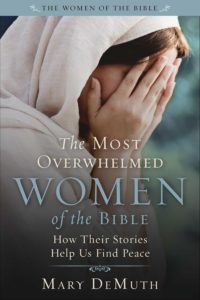Mary DeMuth is a literary agent, mentor, and the author of 52 books. Her most recent is called “The Most Overwhelmed Women of the Bible: How Their Stories Help Us Find Peace” (Regnery Faith, $17.99).
The blurb runs: “With the onset of social media, we not only worry about myriad tasks, but we feel bad if we don’t measure up to everyone else’s highlight reels. We lack Sabbath, and we push away rest — even though we desperately need it. And yet, the Bible is replete with women just like us — women who felt the weight of overwhelming schedules and circumstances. In their stories, you will not only learn more about the women of the Bible, but you’ll begin to unpack ways to find true rest and peace.”
The book presents 10 biblical women who experienced “overwhelm” in various ways, encourages readers to identify with them, and invites us to reflect on their stories in conjunction with the questions many of us ask, for example:
Why do some people seem to be able to balance everything?
What would a peaceful, restful life look like for me?
How can I find God in the midst of my busy life?
“The longer I live,” DeMuth observes, “the more I abhor the so-called ‘prosperity gospel’ that promises if we pull all the right levers God is obligated to bless us with health, wealth, and social standing. The problem with that way of thinking is the reality of the human condition coupled with the fallenness of our world system. The world cannot satisfy us way down deep; it can only slake our thirst for a moment.”
Each chapter begins by plunging straight into a biblical retelling, written with free authorial license, of the story in question. We’re given neither the biblical source, nor context of any kind, until several pages in. Because I wasn’t familiar with most of the women, I personally found this confusing and would much have preferred to learn the story through the Scripture itself.

Quibble aside, the stories are fascinating. If times were different then, family, political, spiritual, ecclesial, relational, and sexual dysfunction were not.
Granted, these women didn’t have to deal with email, freeway driving, or cellphones, but they had other challenges we can’t even imagine.
Take Zipporah, “the Nomadic one”: Moses’ wife. Her story is told in Exodus, Chapters 2, 4, and 18.
After marrying Moses, and while she’s pregnant with their first child, he informs her that he’s a murderer and there’s a bounty on his head. That alone had to have been pretty stressful.
After she bears him two sons, Moses comes home one day and announces he’s seen a burning bush and received a message from God. Though Moses is old by this time, he’s to be the deliverer of Israel — to lead them out from under their Egyptian oppressors and into the Promised Land.
Also stressful!
Then, as they’re setting off on donkeys to an unknown fate with the kids, Zipporah hears the voice of God saying he’s going to kill Moses unless they have both sons circumcised.
Which son isn’t specified (one was circumcised; one wasn’t), nor how old he was at the time, though the implication is that he was older than the eight days generally designated as the time within which the cutting should take place.
Whatever the case, her husband’s life was at stake — so Zipporah took knife in hand and circumcised their son herself.
That’s hardcore!
DeMuth really shines at the end of each chapter when she articulates the overall psycho-spiritual challenges each woman faced. In Zipporah’s case, these include “Following Another’s Dream,” “Navigating the Grief and Pain of Another,” “Dealing with a One-Sided Relationship,” and “Feeling the Sting of Un-seenness.” What human being hasn’t faced the pain of each of those situations? We can relate.
Other women include Sarai, the Disbelieving One (Genesis 12–18 and 2–23); Manoah’s Wife, the Grieved One (Samson’s mother, Judges 13–16); Naaman’s Slave Girl, the Imprisoned One (2 Kings 5); Huldah, the Burdened One (a prophetess in ancient Israel, 2 Kings 22: 14–20 and 2 Chronicles 34:1–35); Esther, the Fearful One (Ezra 1–10); Elizabeth, the Barren One (Luke 1); The Blessed Virgin Mary, the Pierced One; The Widow, the Broke One (Mark 12:41–44, Luke 21:1–4); and Priscilla, the Displaced One (Acts 18 and others).
At the end of each chapter, DeMuth leaves the reader with several hopeful statements — “Truths About” the “Rooted,” or “Brave” or “Bold” you.
Examples:
“Courage is not the absence of fretting; it’s the presence of it while still moving forward.”
“We may not know the outcome of our obedience, but we must obey anyway.”
“It is possible to thrive in a perverse culture.”
Finally, each chapter ends with several Discussion Questions that would serve for individual reflection, or for conversation with a friend, spiritual adviser, or group.
I learned of several overwhelmed women who were unfamiliar to me. And I’m glad to know I’m not alone.

